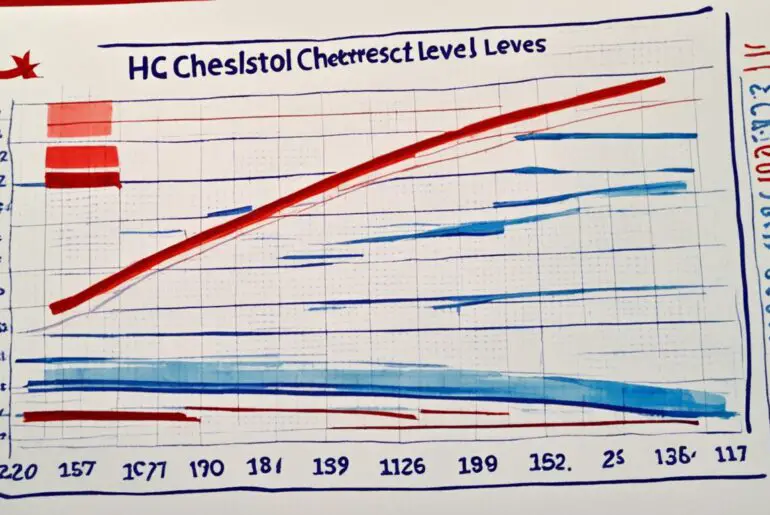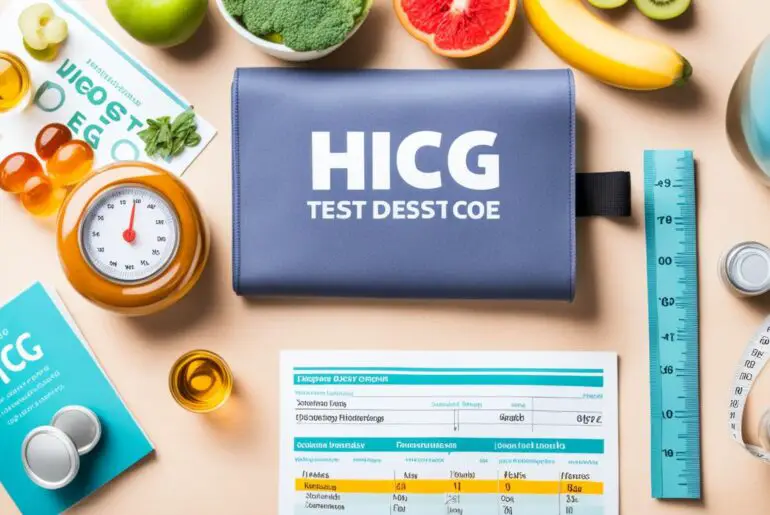Are you considering the HCG diet for rapid weight loss? Think twice before you jump on the bandwagon. While this diet claims to help you shed pounds quickly without feeling hungry, there may be a hidden cost: muscle loss. Could the HCG diet be sabotaging your muscle preservation goals? Let’s explore the science behind this controversial weight loss strategy and uncover the truth about its potential side effects.
At first glance, the HCG diet seems like an attractive option. Proponents rave about its ability to kickstart weight loss while maintaining muscle mass. However, it’s important to separate fact from fiction and examine whether the HCG diet truly lives up to its promises.
Key Takeaways:
- The HCG diet claims to promote rapid weight loss without hunger.
- The FDA considers the HCG diet illegal and dangerous.
- HCG, or human chorionic gonadotropin, is a hormone commonly associated with pregnancy.
- There is limited scientific evidence supporting the HCG diet’s effectiveness.
- The extreme calorie restriction on the HCG diet can lead to muscle loss and nutrient deficiencies.
What is HCG?
HCG, or human chorionic gonadotropin, is a hormone that is present in high levels during early pregnancy. It serves as a marker in home pregnancy tests, indicating the presence of pregnancy. Furthermore, HCG has been utilized to treat fertility issues in both men and women.
This hormone was first proposed as a weight loss tool by British doctor Albert Simeons in 1954. Dr. Simeons combined HCG injections with an ultra-low calorie diet in his weight loss protocol.
“HCG, or human chorionic gonadotropin, is a hormone that is present in high levels during early pregnancy.”
This unique hormone plays a critical role in early pregnancy, contributing to the healthy development of the uterus and fetus. However, elevated levels of HCG beyond pregnancy can be an indication of certain cancers.
Overall, HCG has garnered attention for its various applications, ranging from pregnancy testing to fertility treatment. Moreover, it has been promoted as a tool for weight loss, although its effectiveness and safety have been a topic of debate.
Key Points:
- HCG is a hormone that is present in high levels during early pregnancy.
- It serves as a marker in home pregnancy tests and has been utilized to treat fertility issues.
- Elevated levels of HCG can also be indicative of certain cancers.
- British doctor Albert Simeons first proposed HCG as a weight loss tool in 1954.
- HCG plays a critical role in supporting the healthy growth of the uterus and fetus during pregnancy.
HCG’s function in the body
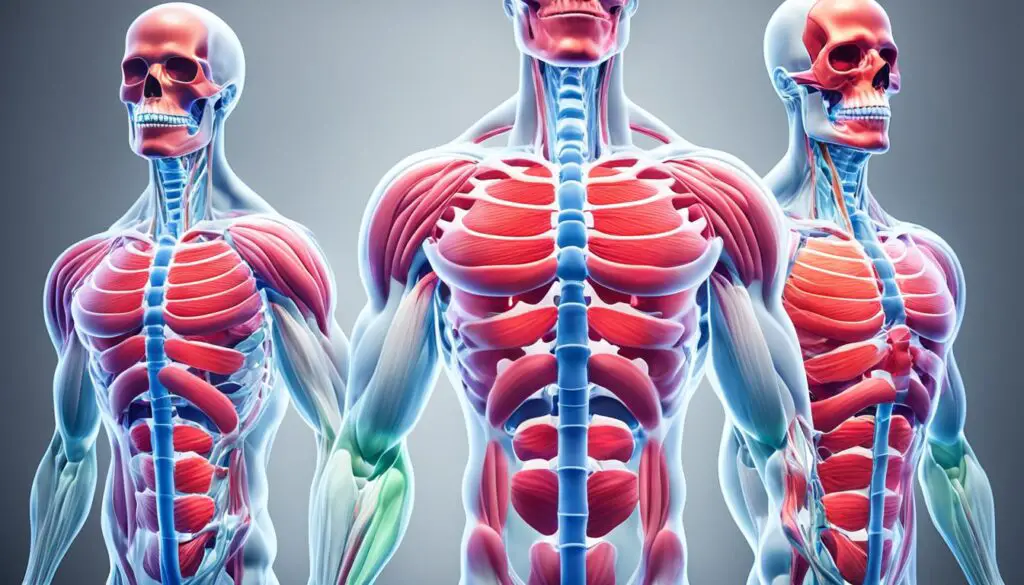
HCG, or human chorionic gonadotropin, is a protein-based hormone that the body naturally produces during pregnancy. Its primary function is to support the healthy growth of the uterus and fetus by maintaining the production of other essential pregnancy hormones, such as progesterone. Progesterone plays a crucial role in preparing the uterus for implantation and supporting the development of the placenta, which provides vital nutrients to the growing baby.
During the early stages of pregnancy, HCG levels rise rapidly and can serve as a marker for confirming pregnancy, as it is present in urine and blood tests. HCG also helps regulate the production of estrogen and progesterone, which are essential for the maintenance of the pregnancy and the prevention of menstrual bleeding. By ensuring the proper balance of these hormones, HCG supports the overall health and well-being of both the mother and the developing baby.
“HCG plays a crucial role in sustaining pregnancy by supporting the production of other essential hormones, such as progesterone, which are necessary for the healthy growth of the uterus and fetus.”
After the first trimester, typically around three months into pregnancy, HCG levels gradually start to decrease as the placenta takes over the production of the hormones necessary for supporting the developing fetus. However, HCG continues to play a vital role throughout pregnancy, ensuring the proper functioning of the placenta and the overall well-being of both the mother and baby.
HCG and weight loss
Proponents of the HCG diet claim that it boosts metabolism and leads to significant fat loss without causing hunger. The concept is based on the belief that the HCG hormone can tap into stored fat reserves and burn them for energy, resulting in rapid weight loss. However, scientific evidence does not support these claims.
Multiple studies have shown that weight loss on the HCG diet is primarily attributed to the extreme calorie restriction rather than the HCG hormone itself. In fact, studies comparing HCG injections to placebo injections found no significant difference in weight loss between the two groups.
The extreme calorie restriction of the HCG diet, which limits daily calorie intake to as low as 500 calories, is the main driver of weight loss. Such severe calorie restriction can induce a state of ketosis, where the body starts breaking down stored fat for energy. This is the primary reason why significant fat loss occurs on the HCG diet.
However, it is essential to note that this extreme calorie restriction can also result in muscle loss and a decrease in metabolic rate. In order to preserve muscle mass and prevent a decrease in metabolism, it is important to follow a balanced diet that provides adequate protein and nutrients.
While the HCG diet may initially seem enticing due to the promise of rapid weight loss without hunger, it is crucial to approach it with caution. Consultation with a healthcare professional is essential before starting any weight loss journey.
“Weight loss on the HCG diet is primarily attributed to extreme calorie restriction rather than the HCG hormone itself.”
There are safer and more sustainable methods for weight loss that focus on long-term lifestyle changes, balanced nutrition, and regular physical activity. These methods promote overall health and well-being while preventing muscle loss and metabolic slowdown.
Key Takeaways:
- The HCG diet claims to boost metabolism, promote fat loss, and prevent hunger.
- Scientific evidence does not support these claims, and weight loss on the HCG diet is primarily due to extreme calorie restriction.
- The severe calorie restriction can lead to muscle loss and a decrease in metabolic rate.
- Consultation with a healthcare professional is important before starting any weight loss journey.
- There are safer and more sustainable methods for weight loss that focus on overall health and well-being.
HCG’s effect on body composition

One common side effect of weight loss is the decrease in muscle mass, particularly in diets that severely restrict calorie intake like the HCG diet. While the HCG diet claims to prevent muscle loss, there is no scientific evidence to support this claim. In fact, very low-calorie diets that restrict calorie intake, like the HCG diet, can actually lead to muscle loss and a decrease in metabolic rate.
During weight loss, the body often breaks down muscle tissue for energy when calorie intake is insufficient. This can result in a reduction in muscle mass and a higher proportion of weight loss coming from muscle rather than fat. Muscle loss is problematic as it not only affects physical appearance but also has negative implications for overall health.
The Role of Muscle Mass in Weight Loss
Muscle mass plays a crucial role in weight loss and maintaining a healthy body composition. It is metabolically active tissue, meaning it requires energy (calories) to maintain. Having more lean muscle mass can increase the body’s metabolic rate, making it easier to burn calories and maintain weight loss in the long term.
Additionally, maintaining or increasing muscle mass while losing weight can help improve body shape and enhance physical performance. It provides a toned and defined appearance, contributes to strength and functional movements, and supports overall body strength and stability.
Unfortunately, very low-calorie diets like the HCG diet do not prioritize muscle preservation. These diets typically involve severe calorie restriction, which can lead to a catabolic state in the body. In this state, the body starts breaking down muscle tissue to meet its energy demands, resulting in muscle loss.
Moreover, severe calorie restriction often leads to feelings of fatigue, weakness, and decreased physical performance, making it challenging to engage in regular exercise and resistance training. This further exacerbates muscle loss and hampers efforts to maintain or increase muscle mass during weight loss.
Overall, while the HCG diet claims to prevent muscle loss, the restrictive calorie intake likely contributes to muscle breakdown. To promote healthy weight loss and preserve muscle mass, it is essential to follow a well-balanced diet that includes adequate protein, engage in regular exercise, and seek guidance from a healthcare professional or registered dietitian.
| Effects of HCG Diet on Body Composition |
|---|
| Decreased muscle mass |
| Potential increase in body fat percentage |
| Lower metabolic rate |
| Decreased physical performance |
Proper nutrition and exercise are key for preserving muscle mass during weight loss. Incorporating resistance training and consuming adequate protein can help minimize muscle loss and promote a healthy body composition. Relying solely on extreme calorie restriction, such as in the HCG diet, is not a sustainable or effective approach for long-term weight management.
The rules of the HCG diet
The HCG diet is divided into three phases: the loading phase, the weight loss phase, and the maintenance phase. Each phase has specific guidelines to follow to maximize results and ensure safety.
The Loading Phase
- This phase lasts for 2 days.
- During this phase, you are encouraged to eat high-calorie, high-fat foods.
- The purpose of this phase is to prepare your body for the upcoming calorie restriction in the weight loss phase.
The Weight Loss Phase
- This phase typically lasts for 3-6 weeks, depending on your weight loss goals.
- During this phase, you are restricted to consuming only 500 calories per day.
- Your meal plan should consist of two meals per day, each including:
- Lean protein sources like chicken, fish, or lean beef.
- Vegetables such as spinach, broccoli, or lettuce.
- A piece of bread or a serving of crackers.
- A serving of fruit.
It is important to note that the use of butter, oils, sugar, and starch is prohibited during the weight loss phase.
The Maintenance Phase
- The maintenance phase begins after completing the weight loss phase.
- This phase is designed to help stabilize your weight and adjust to a more sustainable calorie intake.
- During this phase, you gradually increase your calorie intake while maintaining a healthy eating plan.
- It is recommended to consult with a healthcare professional or registered dietitian to create a personalized meal plan for this phase.
Following the rules of the HCG diet is essential for achieving the desired weight loss results. It is important to prioritize your health and follow the calorie restrictions and meal plans recommended for each phase.
Scam products on the market
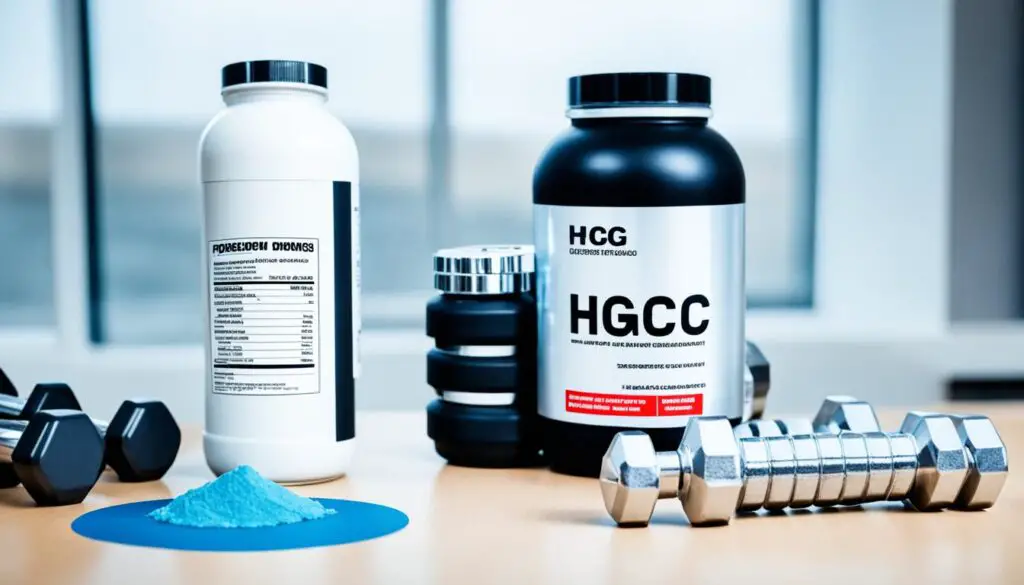
When searching for HCG products online, it’s important to be aware of the scams and misleading claims that exist. Many products labeled as “homeopathic” or available over the counter (OTC) claim to contain HCG but actually do not. Genuine HCG is only available as a prescription injection, under the supervision of a healthcare professional. These unregulated and unauthorized products can be ineffective and potentially harmful to your health.
It’s crucial to exercise caution and avoid purchasing HCG products that do not have proper FDA approval. These unauthorized products may not undergo quality control or meet safety standards, therefore posing serious risks to consumers.
“Beware of HCG products that claim to be homeopathic or OTC. Genuine HCG is only available by prescription.”
The dangers of homeopathic HCG products
Homeopathy is a form of alternative medicine that relies on highly diluted substances to stimulate the body’s natural healing processes. Homeopathic HCG products do not contain any actual HCG hormone and are based on the principle of “like cures like”. In other words, these products claim to help you lose weight by giving you an extremely diluted form of HCG.
However, there is no scientific evidence to support the effectiveness of homeopathic HCG products for weight loss. These products may contain inactive ingredients or substances that do not have any impact on weight loss. Therefore, relying on these products can result in disappointment and wasted time and money.
Choosing authentic HCG products
If you are considering using HCG for weight loss, it is essential to consult with a healthcare professional and obtain a prescription for genuine HCG injections. These injections are carefully regulated and administered under medical supervision, ensuring their safety and effectiveness.
By choosing real HCG products, you can have confidence in their quality and know that you are following a medically approved weight loss strategy. Your healthcare provider will guide you through the appropriate dosage and treatment plan, tailored to your specific needs.
Safety and side effects

The HCG diet has raised concerns about its safety, and the Food and Drug Administration (FDA) has classified it as illegal and dangerous. There have been reports of various side effects associated with the HCG diet, including headaches, depression, fatigue, and in rare cases, blood clots.
The severe calorie restriction of the HCG diet is likely to cause these side effects. When the body is not receiving enough calories, it can lead to headaches and fatigue as the brain and muscles lack the necessary energy to function properly. The extreme restriction may also impact mood, potentially causing feelings of depression.
In rare cases, blood clots have been reported as a side effect of the HCG diet. Blood clots can be a serious medical condition, and it is important to seek immediate medical attention if you experience symptoms such as chest pain, shortness of breath, or swelling in the arms or legs.
Furthermore, the HCG diet’s severe calorie restriction can lead to nutrient deficiencies, as the body is not receiving enough essential vitamins and minerals. This can further contribute to fatigue and other health complications.
It is crucial to prioritize your health and consult with a healthcare professional before considering the HCG diet or any extreme weight loss strategy. A healthcare professional can provide guidance and personalized recommendations to help you achieve your weight loss goals safely and effectively.
Disclaimer: The image used depicts the potential side effects associated with the HCG diet and is for illustrative purposes only.
The bottom line
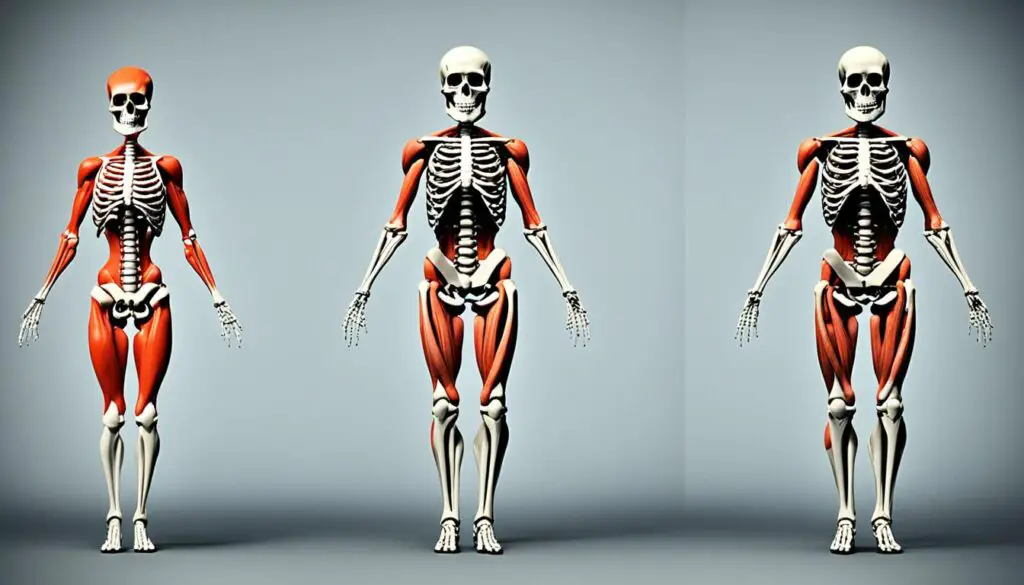
The HCG diet is an extreme weight loss strategy that is not recommended due to its risks and lack of scientific evidence. While it may lead to rapid weight loss, it is unsustainable and can have negative effects on muscle mass, metabolism, and overall health.
Extreme weight loss programs like the HCG diet rely on severely restricting calorie intake, which can result in nutrient deficiencies, fatigue, and other health issues. Additionally, the HCG diet does not promote long-term healthy eating habits or lifestyle changes, making the weight loss achieved through this method difficult to maintain.
Instead of resorting to unsustainable methods, there are more effective and safer weight loss approaches available. Adopting a balanced diet that includes a variety of nutrient-dense foods, engaging in regular physical activity, and seeking guidance from a healthcare professional or registered dietitian are all key components of a successful weight loss journey.
By focusing on sustainable and effective weight loss methods, individuals can achieve their goals while also prioritizing their overall health and well-being.
| Pros of the HCG diet | Cons of the HCG diet |
|---|---|
| – Claims of rapid weight loss | – Lack of scientific evidence |
| – May provide initial motivation | – Unsustainable and difficult to maintain |
| – Can lead to short-term weight loss | – Negative effects on muscle mass and metabolism |
| – Potentially reduced hunger due to low-calorie intake | – Nutrient deficiencies and fatigue |
In summary, while the HCG diet may promise extreme weight loss, it is not a recommended or sustainable method. It is important to prioritize long-term health and focus on effective weight loss strategies that promote overall well-being.
Conclusion
The HCG diet, with its potential risks of muscle loss, nutrient deficiencies, and side effects, should be approached with caution. It is crucial to consult with a healthcare professional before embarking on any weight loss journey. They can provide personalized guidance and help choose safe and sustainable methods for achieving your weight loss goals.
While the HCG diet may promise rapid weight loss, it is not recommended due to the lack of scientific evidence supporting its effectiveness and potential harm to muscle mass. There are better options available for safe weight loss, such as following a balanced and nutritious meal plan, regular exercise, and seeking guidance from a registered dietitian or a healthcare professional.
Remember, prioritizing your health and well-being is key when considering weight loss strategies. It is essential to focus on sustainable habits that support long-term health, rather than resorting to extreme measures that may compromise your muscle mass and overall health. Consultation with a knowledgeable health care professional will ensure you are on the right path towards achieving your weight loss goals safely and effectively.
FAQ
What is the HCG diet?
The HCG diet is a weight loss strategy that combines an ultra-low calorie intake with injections of the hormone HCG.
What is HCG?
HCG, or human chorionic gonadotropin, is a hormone that is present in high levels during early pregnancy.
What is the function of HCG in the body?
HCG’s main function is to support the healthy growth of the uterus and fetus by maintaining the production of other essential pregnancy hormones.
Does the HCG diet lead to weight loss?
Multiple studies have shown that weight loss on the HCG diet is attributed to the extreme calorie restriction, not the HCG hormone itself.
Does the HCG diet cause muscle loss?
Very low-calorie diets like the HCG diet can lead to muscle loss and a decrease in metabolic rate.
What are the rules of the HCG diet?
The HCG diet is divided into three phases: the loading phase, the weight loss phase, and the maintenance phase. During the weight loss phase, individuals consume only 500 calories per day.
Many HCG products available online are labeled as homeopathic and do not contain any actual HCG. Genuine HCG is only available as a prescription injection.
What are the safety concerns and side effects of the HCG diet?
The FDA has raised concerns about the safety of HCG products, and side effects associated with the HCG diet include headaches, depression, fatigue, and in rare cases, blood clots.
Is the HCG diet recommended for weight loss?
The HCG diet is an extreme weight loss strategy that is not recommended due to its risks and lack of scientific evidence. There are more effective and safer methods for weight loss that should be considered.
What is the bottom line about the HCG diet?
The HCG diet poses potential risks, including muscle loss, nutrient deficiencies, and side effects. It is important to consult with a healthcare professional before embarking on any weight loss journey and to choose safe and sustainable methods.


